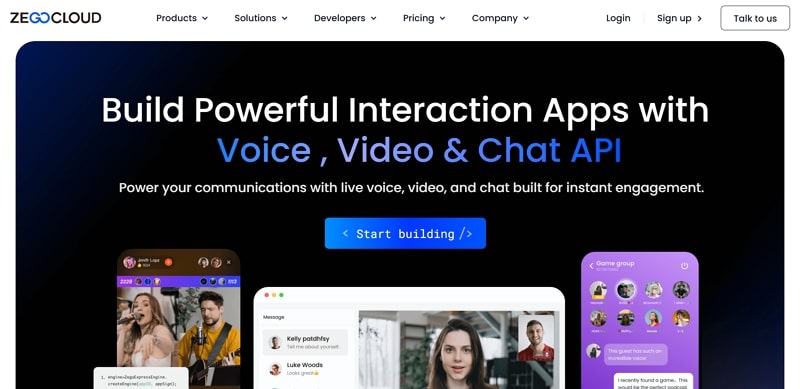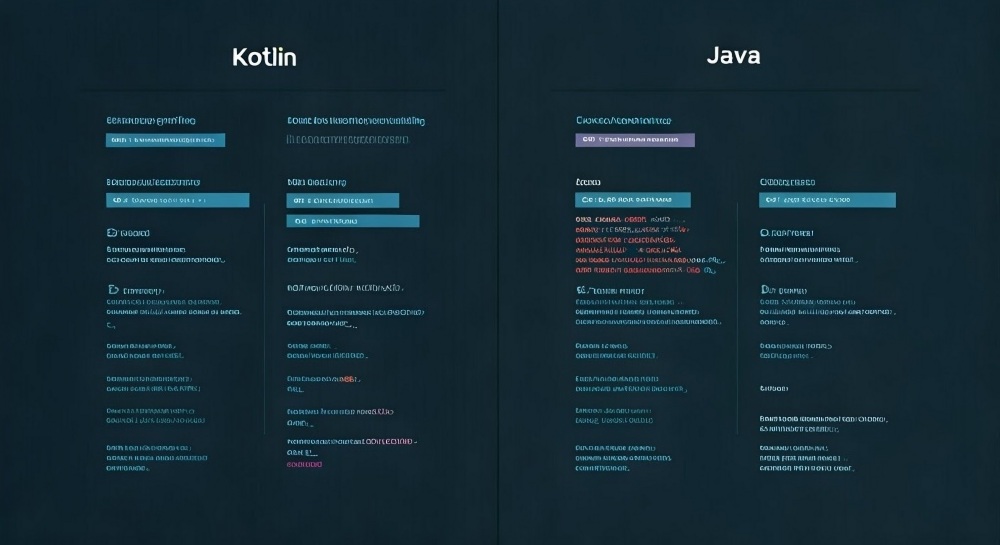As mobile technology advances, the demand for innovative Android applications has skyrocketed. So, it has become even more important to choose the right programming language for development. When looking at the options, Java and Kotlin appear to be the obvious choices due to their advanced features. This article compares Kotlin vs. Java while highlighting their respective strengths to explore which language better addresses today’s Android app development demands.
What is Java?
Before comparing Kotlin and Java, you need to understand the definitions of both these languages. Starting with Java, it stands out as an object-oriented programming language developed by Sun Microsystems in the middle of the 1990s. Now maintained by Oracle Corporation, this language is known for its “write once, run anywhere” capability.
This programming language is also designed to be simple and secure to support multithreading and distributed computing. When comparing Kotlin vs. Java, developers can use the latter to build everything from desktop applications to enterprise systems.
Most importantly, its vast ecosystem includes a rich set of libraries and frameworks to facilitate tasks, including web development. Also, its long-standing popularity is further supported by an active community and extensive documentation.
What is Kotlin?
While discussing Kotlin vs Java for Android development, let’s get a brief overview of this specialized coding language. Supported by Google for mobile app development, Kotlin emerges as a statically typed programming language developed by JetBrains. While developing apps, you can benefit from this language by simplifying code readability and reducing boilerplate.
As a result, this leads to fewer chances of programming errors and more maintainable codebases. Other than that, it supports both object-oriented and functional programming paradigms to write flexible applications. In addition, this language includes features, such as null safety, extension functions, and smart casts, for better results.
Developers can also benefit from its integration into existing Java projects and compatibility with all frameworks. Its modern approach and enhanced productivity tools contribute to a smoother development process and rapid adoption among developers.
Why are We Comparing Kotlin and Java?
When considering which language is suitable for Android development, comparing Kotlin and Java helps developers understand their unique strengths. Moreover, this analysis sheds light on how each language impacts code quality and maintainability. So, let’s explore the main reasons for comparing these two languages before the actual comparison:
- Android Development Process: As we know, these two are the main coding languages used for application development. So, developers and organizations need to choose the language that offers the most efficiency and support for building advanced mobile apps.
- Interoperability: Since Kotlin runs on the Java Virtual Machine, it is fully interoperable with this older coding language. Therefore, developers can use both languages within the same project after comparing them for seamless integration and development strategies.
- Code Conciseness: One of the significant reasons for comparing Kotlin vs. Java performance is to evaluate their differences in code verbosity. Generally, Kotlin’s syntax is more expressive than Java’s, which is crucial for faster development cycles.
- Error Prevention: While Kotlin includes advanced features like null safety, Java requires more manual checks and handling. So, you need to compare them beforehand to assess which language ensures greater reliability and fewer runtime errors.
Differences Between Kotlin and Java
Upon transitioning from Java to Kotlin, developers will notice improvements in readability and conciseness. Through this comparative table, you will be able to compare both these programming languages to make the choice easier for you.
| Metrics | Java | Kotlin |
|---|---|---|
| Description | As discussed, Java stands out as a statically typed object-oriented language with extensive libraries and support for high-performance applications. | When comparing Kotlin vs. Java, the first one is more focused on null safety and streamlined syntax, especially for Android development. |
| Android Development | Originally, it was the primary language for Android, with many legacy APIs and apps written in Java. | With its advanced features, Kotlin has emerged as Google’s official recommendation for Android development since 2019. |
| Type System | This coding language allows null references, which cause potential NullPointerExceptions. | However, null safety is built into this language to reduce null-related errors. |
| Raw Types | Allowed | No Support |
| Checked Exceptions | Through this language, checked exceptions are enforced, requiring explicit error handling. | As we compare Kotlin and Java, the first one does not support checked exceptions to allow simpler code but with less enforced error handling. |
| Static Members | Yes | No |
| Null-Safety | Within Java, variables can be null without restrictions, leading to potential errors. | Kotlin has a built-in null-safety feature to prevent null references by default. |
| String Templates | No | Yes |
| Properties | Not available | When comparing Kotlin vs. Java for Android, the properties replace fields to integrate getters and setters by default. |
| Range Expressions | Limited | Supports multiple types of range expressions. |
| Annotation Processing | Java requires explicit annotation processing and libraries like Lombok for code generation. | On the other hand, Kotlin supports annotation processing while offering built-in features to reduce the need for external libraries. |
| Operator Overloading | Not Possible | Highly Possible |
| Functional Programming | Generally, it supports lambda expressions but lacks extensive support for functional constructs. | Compared to Java, Kotlin provides higher-order functions and functional programming features such as map, filter, and reduce. |
| Code Readability | Harder | Easier |
| Compatibility with Each Other | Java cannot use Kotlin code directly. | Kotlin is fully interoperable with Java, allowing it to call and use libraries seamlessly. |
| Code Conciseness | Verbose | Concise |
| Runtime Performance | Java can sometimes be slower due to garbage collection, especially in long-running processes. | While discussing Kotlin vs. Java performance, the first one can be more efficient due to features like null safety and less boilerplate code. |
| Type Inference | Limited | Advanced |
| Best For | Cross-platform applications, Enterprise-level apps requiring high stability, Apps needing complex backend services | Android applications, Reactive programming, Lightweight applications requiring high-efficiency |
Kotlin vs Java: Which is Better?
As one of the best programming languages, Java remains a reliable option for enterprise applications. Known for its “write once, run anywhere” approach, it is suited for large-scale web applications and enterprise systems. Moreover, its use in banking and data-heavy environments underscores its capacity for high-performance applications.
However, as app development has evolved, Java’s verbosity and limitations in handling certain issues have revealed some challenges. To cater to these problems, Kotlin emerges as the best solution with a cleaner language that integrates seamlessly with Java. Let’s dive into the following point to know how Kotlin improves on some of Java’s limitations to stand out as a better option:
1. Null Safety and Null References
While using Java, any variable can hold a null reference by default, which leads to the dreaded NullPointerExceptions. This issue often results in crashes or errors, requiring developers to implement extensive null checks.
However, Kotlin addresses this with null safety in its type system to prevent variables from being null unless explicitly marked. So, this design significantly reduces the occurrence of null-related runtime errors for more stable applications.
2. Concise Syntax and Less Boilerplate
Typically, Java’s verbosity often leads to boilerplate-heavy code, requiring developers to write a lot of repetitive syntax. When comparing Kotlin vs. Java, its syntax is significantly more concise, which makes it a far better option. For example, its data classes eliminate the need for multiple lines of getters, setters, and other standard functions in Java.
3. Elimination of Raw Types
While discussing these languages, we will see that Java allows the use of raw types. So, this means the compiler does not check for type safety on generic types. In contrast, Kotlin does not allow raw types to enforce strict type checks on generics to prevent runtime type mismatches. All of this guarantees that collections or other generic structures only hold elements of a specific type.
4. Array Invariance
Java can provide runtime errors, as you cannot assign an array of a subclass to a variable of an array of a superclass. For instance, if you assign an array of integers to an array of objects, it will throw an exception if you try to add non-integer values. On the other hand, Kotlin handles arrays with invariance for a more flexible approach to type assignments.
As we summarize this Kotlin vs. Java for Android comparison, we can say that Kotlin is a much better option when it comes to modern development. Due to its advanced features and protocols, this coding language makes the process much easier.
Enhancing Java and Kotlin Applications with ZEGOCLOUD
Irrespective of the language you choose for programming, ZEGOCLOUD will ease the app development process for you. With its pre-built APIs and SDKs, developers get the chance to integrate real-time communication features into their Android applications. Using its advanced in-app chat API, you can provide users with features like notifications and file-sharing while developing an application.

Other than that, you can add an advanced video-calling mechanism to your apps through its APIs. By using this specific API, developers get to integrate beautification and AI filter features into their Android applications. Also, its SDKs help you add screen-sharing features to your app, which is beneficial for learning applications. Moreover, its live-streaming API is a game changer when developing education and social platforms.
Moreover, with these innovative APIs, creators will get their hands on applications that provide ultra-low latency of 600ms to 1s for interactive live sessions. While using its voice-calling SDK, developers get to add fun voice-changing features to their applications. All in all, ZEGOCLOUD is a perfect platform for developers looking to create apps using Kotlin and Java.
Conclusion
After comparing Android Kotlin vs Java, we can summarize that both languages offer unique features for Android development. On one hand, Java remains an established choice for large-scale applications, especially in cross-platform domains.
However, Kotlin’s null safety and interoperability make it ideal for efficient and error-resistant app development. For developers working in either language, ZEGOCLOUD’s APIs and SDKs can enhance applications with real-time communication and interactive features.
Read more:
FAQ
Q1: Is Kotlin better than Java?
Kotlin is often considered better than Java for modern app development because it offers more concise syntax, null safety, and improved type inference. These features help reduce boilerplate code and minimize runtime errors, making development faster and more efficient. However, Java remains more mature, with broader support and a larger ecosystem.
Q2: Will Kotlin replace Java?
While Kotlin is gaining popularity, especially in Android development, it is unlikely to completely replace Java. Java is deeply entrenched in enterprise applications, web development, and legacy systems. Both languages are expected to coexist, with Kotlin being the preferred choice for new Android projects.
Q3: Will Kotlin surpass Java?
In terms of usage for Android development, Kotlin has already surpassed Java as Google’s preferred language. However, in the broader programming landscape, Java still holds a dominant position due to its extensive use in various industries and applications. Kotlin’s growth is promising, but surpassing Java entirely depends on long-term trends.
Q4: Is Kotlin only used for Android?
No, Kotlin is not only used for Android. It can also be used for backend development with frameworks like Ktor, web development with Kotlin/JS, and even cross-platform development using Kotlin Multiplatform. Its versatility allows developers to use Kotlin in various areas beyond Android.
Let’s Build APP Together
Start building with real-time video, voice & chat SDK for apps today!










